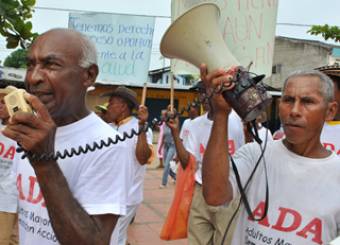 Last week, I took part in the fifth Pan-American Gerontology and Geriatrics congress in Colombia. I was invited by Lia Daichman of the International Network on the Prevention of Elder Abuse (INPEA) to speak on the progress made in advancing older people’s rights at an international level.
Last week, I took part in the fifth Pan-American Gerontology and Geriatrics congress in Colombia. I was invited by Lia Daichman of the International Network on the Prevention of Elder Abuse (INPEA) to speak on the progress made in advancing older people’s rights at an international level.
Lia gave an emotional rendition of INPEA’s crucial work in raising awareness of elder abuse, and how difficult it is to address as it is principally close family who carry out the abuse. She is based in Argentina and has been a tireless advocate for older people’s rights for 25 years.
Convention on rights of older people
Susan Somers also from INPEA in New York shared how ageing is gradually being taken on board by various spaces at the UN. These include the Commission on Social Development and of course the Open-ended Working Group on Ageing where the Global Alliance, which includes HelpAge, is pushing for an international convention on the rights of older people. Susan is quite special: a fearless activist who has done so much to get ageing on the agenda at the UN.
Rosy Pereyra spoke of the need for a convention and progress made so far. Although Europe and the US aren’t yet on board, Latin America is leading the charge, in particular Argentina. Alex Kalache, Head of the International Longevity Centre in Brazil spoke brilliantly of the longevity revolution and how recognising older people’s rights is key to the successful ageing of gerotolescents: older people who are active, dynamic, exploratory and self-reinventing.
Presenting the Global AgeWatch Index
I presented HelpAge’s Global Agewatch Index, an instrument that is inviting respect by academics in the field of gerontology, which is no bad thing. There is quite a bit of work to do, though, to get the more conventional gerontologists and geriatricians to think in terms of rights and the social determinants of health in old age. There is hope though. Three presentations stood out for me:
Bibiana Graeff, Professor of Law on Human Rights and Ageing, gave an overview of the legislative framework on older people’s rights in Brazil, and the importance of rights education for older people, carers and the staff of government programmes. There is much in Brazilian legislation that exists for older people, but it is still little known, understood or implemented.
Joséphine Loock, a researcher from the Research Centre on Aging in Montreal is doing really interesting research with Montreal police and social workers to improve the state´s and civil society’s response to elder abuse.
Recognition for a rights perspective
Rosa Aizen, a psychologist and social worker in Buenos Aires, is leading a team of social workers who are working closely with local authorities and the police to prevent, detect and respond to elder abuse. The model is particularly fascinating because it includes therapeutic support for family members who commit the abuse. Very forward looking.
I think it’s very important for HelpAge to participate in this kind of event. There are still many gerontologists and geriatricians who need to recognise and incorporate a rights perspective in their work.
Read more about our work on a convention on the rights of older people.
